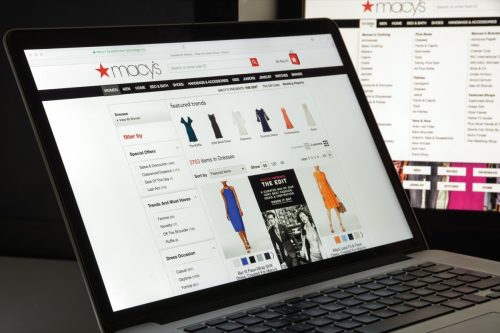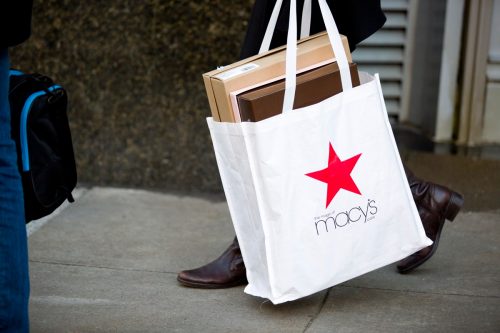Shoppers Are Abandoning Macy’s, Data Shows—Here’s Why

While Macy’s is known for one-stop-shopping at its giant department stores, the company has been actively changing with the times. The retailer is closing its mall anchor stores and opening smaller shops (called Bloomie’s and Market By Macy’s) to draw in younger crowds, while also refining its inventory. But while Macy’s is refreshing its image, the company is struggling to maintain its customer base, according to newly released data. Read on to find out why shoppers are abandoning Macy’s.
RELATED: Shoppers Are Abandoning Target, Data Shows—Here’s Why.
Macy’s beat expectations, but sales are down.

In an Aug. 22 press release outlining its second quarter results, Macy’s announced that it did better than Wall Street expected, but revenue remained down compared with previous years. Per the release, net sales were down 8 percent, brick-and-mortar sales were down by 8 percent, and digital sales were down by 10 percent compared with the same quarter in 2022.
The company is keeping a cautious outlook for the rest of 2023, because it anticipates that sales will continue to fall—and CEO Jeff Gennette offered some insight as to why that is.
RELATED: Shoppers Are Turning Away From Dollar Tree—Here’s Why.
Shoppers are “under pressure,” the CEO said.

In the press release, Gennette cited the “uncertainty” associated with the economy, also telling CNBC that “the consumer continues to be under pressure.”
As Reuters reported, the retailer warned that people will likely spend less in the second half of the year—even through the holiday shopping season—as consumers are struggling and less focused on discretionary purchases. Reuters noted that Macy’s is experiencing decreased demand from middle-income shoppers, who aren’t picking up new handbags and clothes due to ongoing inflation.
Instead of spending at Macy’s, Gennette told CNBC that shoppers are investing in experiences and bracing themselves for the fall, when student loan payments return.
RELATED: Shoppers Are Abandoning Home Depot, Data Shows—Here’s Why.
People aren’t able to pay their credit card bills.

Illustrating consumers’ financial woes, Macy’s also reported an uptick in customers who can’t make their credit card payments. An increase was expected after the COVID-19 pandemic, but according to Macy’s executives, they didn’t predict that delinquencies would mount this quickly.
“The speed at which the increase occurred for us and the broader credit card industry … was faster than planned,” Adrian Mitchell, Macy’s chief operating officer and chief financial officer, told analysts during an earnings call yesterday, per CNN.
According to the press release, the rise in delinquencies was the main driver behind an $84 million decrease in revenue for the company.
“I think the credit card revenue is an indication of some of the pressures that we’re actually seeing on the consumer,” Mitchell said, per CNN. “This is about credit card balances, this is about student loans which we know is going to come into focus in the next month or two, auto loans, mortgages.”
RELATED: For more up-to-date information, sign up for our daily newsletter.
Macy’s is strategically addressing the situation.

Gennette told CNBC that the company is making changes to draw customers back in. Executives are focused on stocking the items that shoppers want to buy, specifically fragrances and beauty products. Macy’s is also bringing back Under Armour and Nike brands, which haven’t been available in recent years.
“We’re moving into areas of interest,” Gennette told CNBC. “We’re pulling back on categories that aren’t working. So we’re ready for the back half [of the year] to respond to the consumer where and when they shop.”